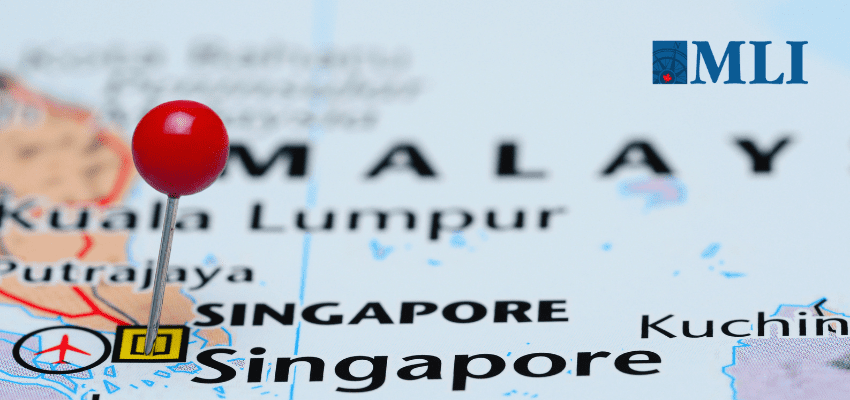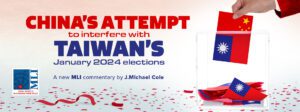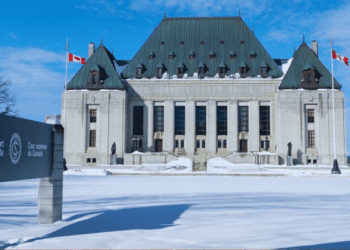By Stephen Nagy, June 7, 2024
Indo-Pacific countries are forging new alliances in response to rapidly evolving challenges in the region. This was seen first-hand at the 21st Shangri-La Dialogue, a premiere venue for security and defence officials and experts to gather and listen to each other’s interpretations of challenges facing the world today.
Ordinary Canadians should not be criticized for wondering why the May 31–June 2 summit in Singapore was significant for Canada, considering its location and seemingly niche topics of discussion. But ordinary Canadians should not overlook that the discussions and speeches made at the dialogue have a Canadian angle and will impact the everyday lives of Canadians.
For example, at the 2022 Shangri-La Dialogue, Japanese Prime Minister Kishida Fumio stressed that “today’s Ukraine could be tomorrow’s East Asia.” Philippines President Ferdinand Marcos Jr. echoed Kishida’s concerns at the 2024 Shangri-La Dialogue, stressing that “illegal, coercive, aggressive, and deceptive actions (by China) continue to violate our sovereignty, sovereign rights, and jurisdictions” and that “attempts to apply domestic laws and (regulations) beyond one’s territory and jurisdiction violate international law, exacerbate tensions, and undermine regional peace and security.”
Canadians must grapple with the idea of “the connectivity of war,” (coined by Akita Hiroyuki of the Nikkei newspaper). Whether it is Russia’s full-scale invasion of Ukraine, Hamas’s brutal attack of Israel, and the subsequent Houthi rebel attacks on lines of communication that traverse the Red Sea, or the continuing Chinese harassment of Filipino and Vietnamese fishermen, coercion across the Taiwan strait, or lawfare tactics in the East China Sea against Japan, conflict in these far away regions can and does impact Canadians and Canadian security.
Russia’s war on Ukraine and Houthi attacks in the Red Sea have affected energy and food security of many of our friends and allies. Houthi attacks have prompted shipping companies to bypass the Red Sea by using the Cape of Good Hope and the Straits of Magellan, increasing shipping costs by 175 to 200 per cent, according to Marco Forgione, director general at the Institute of Export & International Trade.
Increased cost of transport translates into increased costs of goods, services, and energy. All of which impact Canadian pocketbooks.
Accidental or intentional conflict in the South China Sea has the potential to disrupt US$5.5 trillion in imports and exports that are ferried through the expansive waters.[1] Some estimates suggest that conflict across the Taiwan Strait could cost more than US$10 trillion in damage or 10 percent of global GDP.[2] Even a dispute between Japan and China in the East China Sea over the Senkaku Islands has the potential to harm our major trading partners in the region.
The comments of Kishida and Marcos stress that China’s track record of coercive behaviour is undermining the region’s peace, security, and stability. They are voicing concerns that the prosperity and progress the region has enjoyed in the post-Second World War period – made possible by the United States and its support for an international order based on rule of law – is under extreme pressure.
The speech by China’s defence minister, Admiral Dong Jun, at this year’s dialogue has done little to allay the concerns of Indo-Pacific stakeholders and Canadians who tuned into the speech. Dong’s speech could be best characterized as threatening and filled with historical misunderstandings.
Dong made strong statements such as “anyone who dares to separate Taiwan from China will only end up in self-destruction.” He stressed China’s peaceful history and strategic culture of compromise, preference for peaceful coexistence and dialogue rather than military force to resolve problems among neighbours. He also asserted that China never uses coercive force against its neighbours or engages in interference in other countries.
Threats over Taiwan are not uncommon but comments about never using coercive force or engaging in political interference left audience members from Canada, Southeast Asia, South Korea, Japan, and Australia with many questions. All have been recipients of Beijing’s coercive diplomacy and interference.
Japan, the Philippines, Southeast Asia countries and other stakeholders all recognize that China is and will continue to be a key economic partner in the region. It will also be a necessary partner in solving regional and global issues. At the same time, many countries continue to be concerned – based on Chinese behaviour, not rhetoric – that a China that economically dominates the region will also demand deference to China’s core interests. This is tantamount to losing strategic autonomy on issues of national priority.
For countries and political entities, such as Taiwan, surrounding China, this could mean giving up territory to China in the South and East China Seas, and engaging in self-censorship on issues sensitive to the Chinese Communist Party. Examples include not discussing the 35th anniversary of the Tiananmen Square Massacre, human rights violations against Uyghurs in Xinjiang, or the abrogation of the 1984 Sino-United Kingdom agreement over the fate of Hong Kong.
Canada has experienced Chinese justice and demands with the arrest of Michael Kovrig and Michael Spavor following the legal detainment of Huawei executive Meng Wanzhou. We also experienced sanctions on our agricultural and other products during this period.
Third, the speeches of Kishida and Marcos highlight the growing importance of anchoring the United States into the Indo-Pacific region, investing in mineral partnerships, and creating stronger ties between advanced and developing countries so that their security, development, and economic interests are aligned.
Marcos highlighted emerging new quadrilateral partnerships such as the Maritime Cooperative Activity between the US, Japan, Australia, and the Philippines – each in part seeking to deal with maritime tensions and reduce the revisionist influences of China in the South China Sea. Moreover, Marcos, Kishida and President Joe Biden also agreed at a White House summit in April to promote inclusive economic growth and resilience, develop critical and emerging technologies, develop the Luzon corridor, advance their climate partnership and clean energy supply chains, and partner for peace and security.
South Korea and Japan, with support from allies and partners like Australia, have agreed to put past disagreements behind them to deepen security co-operation. They also agreed to develop a framework within the year to “institutionalize” trilateral security co-operation involving senior-level policy consultations, information-sharing and joint exercises.
The emerging latticework of minilaterals in the Indo-Pacific are not military alliances or commitments to fight for each other as an Asian NATO. Rather, they are problem-solving mechanisms meant to share the challenges of governing such a broad region and avoid escalatory behaviour that might spark a conflict with revisionist states in the region.
The minilateral trend will be important for Canada as it thinks about how to pursue its interests in the Indo-Pacific. Canada’s comparative advantages in countering disinformation may be a concrete area of co-operation to form its own mini-lateral partnership that brings value to the region. Partnering at the non-state level with South Korea, Japan, Taiwan, Australia and the US, Canada may be able to form a consortium of universities tasked with countering disinformation.
As I noted in a published article with Thomas Murphy:
University consortiums, once established, can serve a myriad of purposes that are beneficial to all involved. Ones such as this could allow those involved to identify challenges facing the region in regard to cybersecurity, as well as identify and share methods and best practices to mitigate said challenges.
Moreover, such initiatives can help foster a cyber-aware culture among their members through focusing on critical areas such as education and literacy. Co-operation on identification, mitigation, defence, response and educational initiatives can serve an even greater purpose in reaching the public — vaccinating citizens in open societies against disinformation through awareness programs in schools, as well as through public awareness programs in the media.
Initiatives such as this could even be grouped as minilateral engagement groups under the umbrella of larger frameworks, such as G7, or looking within the Indo-Pacific, the QUAD, with the goal of leveraging the strengths of practitioners to develop robust and collective responses to cyber issues.
The Shangri-La Dialogue presented a constructive opportunity for Canadian policy-makers and security and defence professionals to learn the currency of security and defence in the Indo-Pacific, and assess trends that will be useful for Canada in its security and defence engagement in the region. It also served to highlight Canada’s security concerns but also its assets, approaches, and problem-solving partnerships to the region.
Stephen Nagy is a senior fellow at the Macdonald-Laurier Institute and a professor at the International Christian University, Tokyo. @nagystephen1.








